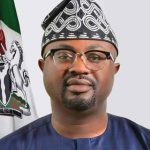The National Security Adviser (NSA), Babagana Monguno has revealed that the Federal Government is considering to forbid the Almajiri system in order to address the rising insecurity issues in the country.
Babagana Monguno disclosed this during a joint press briefing on the outcome of the National Economic Council (NEC) meeting presided by the Vice President Yemi Osinbajo at the State House, Abuja.
Monguno noted that the Almajiri group had become a problem to the society, adding that education is every child’s right. He also pointed out that drivers of insecurity in the country included unemployment, poverty and increasing population. He said:
“It is very important to proscribe certain groups ultimately running around under the guise of maybe getting some kind of education that is not really formal and then begin to cause a lot of problems for society.
“Ultimately, government will have to proscribe this Almajiri phenomenon because we cannot continue to have street urchins, children roaming around, only for them in a couple of years, or decades to become a problem to society.
“We are not saying that they are going to be contained in a manner that you might think we want to do something that is harmful to them, no. What we want to do is to work with the state governments to enforce the policy of education for every child. It is every child’s right, his entitlement so long as he is a Nigerian.”
He said the model used in the Western region in the 50s and 60s would be consolidated upon and adopted to address the Almajiri challenge.
“If you recall what happened in the Western region, I think in the 50s and the 60s when the Premier made education free and compulsory at both primary and secondary levels. This is what we are looking at,” he said.
Monguno, a retired Major General, said one of the elements of national power was the population of a country.
“Population is a very critical element of national power. It is from the population that you get a critical mass. So, when we look at population, as an element of National security, don’t be surprised if out of every 100 almajiri, you have two neurologists, four architects, two lawyers, and so on and so forth.
“If you don’t start thinking about short and long term to overcome this problem, like I told you earlier on, you require collective efforts. You can’t carry this load and drop it on top of the government, even government should not work as a one-legged tripod, it has to be three-legged.
“We have to deal with the issue of these children, Almajiri, regardless of how people feel about it. We must work in sync with the rest of international communities. How many countries operate this kind of system?
“Let’s be very, very sincere to ourselves, we have to look at this issue that we have been sweeping under the carpet.
“So, when I briefed the NEC, I alerted them on the dangers of this phenomenon and the President in inaugurating NEC also stressed that we must make education free and compulsory. We are not trying to denigrate any group of people,” he said.
He said the Boko Haram insurgency continues to remain very fragile, adding that it’s still a problem that needs to be readdressed with collective effort of both intelligence and operations.






![Denzel Washington Gets Baptised, Receives License To Become A Minister [Photos/Video] 7 Denzel Washington Gets Baptised, Receives License To Become A Minister [Photos/Video]](https://media.kanyidaily.com/2024/12/23154939/Denzel-Washington--150x150.jpg)
!["Davido Is A Gospel Musician, Zlatan Ibile My Son" – Pastor Tobi Adegboyega [Video] 9 "Davido Is A Gospel Musician, Zlatan Ibile My Son" – Pastor Tobi Adegboyega [Video]](https://media.kanyidaily.com/2024/12/23121344/Tobi-Adegboyega-Davido-150x150.jpg)

![Jarvis Addresses Fan's Advice For Her To Undergo Second Tumor Surgery In India [Video] 13 Jarvis Addresses Fan's Advice For Her To Undergo Second Tumor Surgery In India [Video]](https://media.kanyidaily.com/2024/12/23105403/Jarvis-150x150.webp)




![Tiktoker, Seaking Arrested For Insulting Tinubu, Sanwo-Olu And Egbetokun [Video] 23 Tiktoker, Seaking Arrested For Insulting Tinubu, Sanwo-Olu And Egbetokun [Video]](https://media.kanyidaily.com/2024/12/22153518/Seaking-150x150.jpg)

